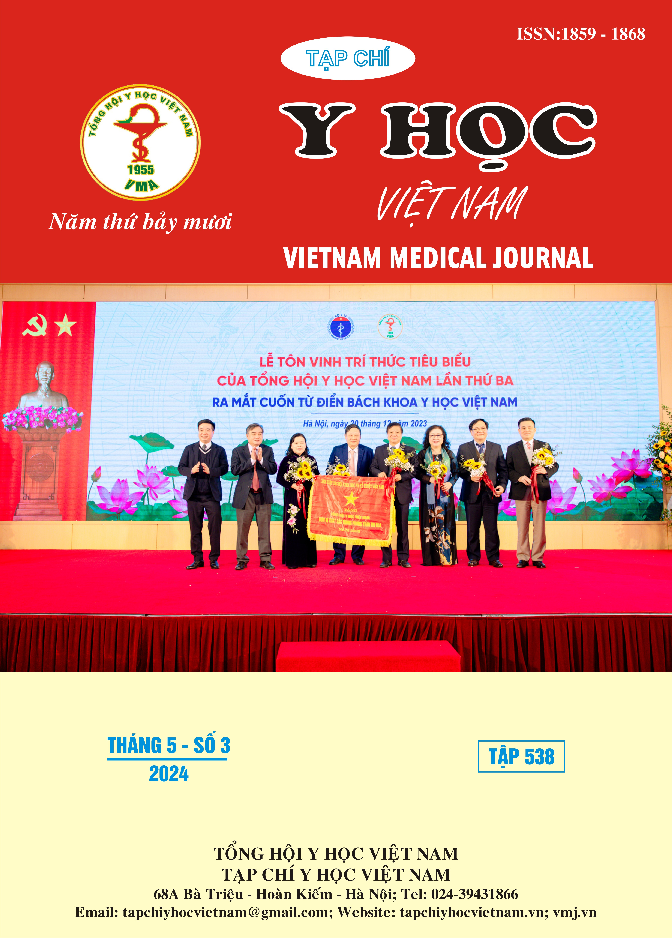RESULTS OF APPLICATION OF ERAS PROTOCOL IN TRAUMA AND ORTHOPAEDICS SURGERY AT 108 CENTRAL MILITARY HOSPITAL
Main Article Content
Abstract
Objectives: To evaluate the feasibility and initial results of the application of the enhanced recovery after surgery (ERAS) program in trauma and orthopedics surgery at the 108 Central Military Hospital. Subjects and methods: A prospective descriptive study on 1275 patients undergoing trauma or orthopedic surgery and applying the ERAS program in the period from July 2022 to December 2022 and a retrospective descriptive study of 601 patients undergoing surgery in the period from April 2022 to June 2022, has not yet been subjected to the ERAS. Results: Overall compliance with ERAS protocol interventions ranged from 78% to 100%. The average of hospital stay is 7.07, a decrease compared to before applying ERAS. The average postoperative VAS score of the first three days was < 4 points. 100% of patients could sit up early and exercise their limbs, and 48% were trained to stand and walk early. Twenty patients (0.015%) had complications after surgery. Eight patients (0.006%) had to be hospitalized within 30 days after discharge. Conclusion: Applying the ERAS program in orthopedic trauma surgery is a feasible and safe option, reducing hospital stay and treatment costs, reducing complications, and helping patients recover early.
Article Details
Keywords
Enhanced recovery after surgery, trauma or orthopedic, ERAS.
References
2. Fearon KC, Ljungqvist O, Von Meyenfeldt M, Revhaug A, Dejong CH, Lassen K, Nygren J, Hausel J, Soop M, Andersen J, Kehlet H. (2005). “Enhanced recovery after surgery: a consensus review of clinical care for patients undergoing colonic resection”. Clin Nutr; 24(3):466-77
3. Kehlet H, Wilmore DW. (2008). “Evidence-based surgical care and the evolution of fast-track surgery”. Ann Surg; 248(2):189-98.
4. Varadhan KK, Lobo DN, and Ljungqvist O. (2010). “Enhanced recovery after surgery: the future of improving surgical care,” Crit. Care Clin; 26 (3): 527-547, doi: 10.1016/j.ccc.2010.04.003.
5. Ngô Sỹ Quý (2019). “Bước đầu đánh giá hiệu quả của chiến lược ERAS trong phẫu thuật đại trực tràng,” Luận Văn Thạc Sỹ Học - Trường Đại Học Hà Nội.
6. Bucher P, Gervaz P, Soravia C, Mermillod B, Erne M, and Morel P. (2005). “Randomized clinical trial of mechanical bowel preparation versus no preparation before elective left-sided colorectal surgery,” Br. J. Surg.; 92 (4): 409-414, doi: 10.1002/ bjs.4900.
7. Wainwright TW, Gill M, McDonald DA, Middleton RG, Reed M, Sahota O, et al. (2020) Consensus statement for perioperative care in total hip replacement and total knee replacement surgery: Enhanced Recovery After Surgery (ERAS(®)) Society recommendations. Acta Orthop 91(1):3–19
8. Hu ZC, He LJ, Chen D, et al. (2019). An enhanced recovery after surgery program in orthopedic surgery: a systematic review and meta-analysis. J Orthop Surg Res;14(1):77.
9. Yin M, Yan Y, Fan Z, et al. (2020). The efficacy of Enhanced Recovery after Surgery (ERAS) for elderly patients with intertrochanteric fractures who received surgery: study protocol for a randomized, blinded, controlled trial. J Orthop Surg Res. 2020;15(1):91.
10. Choi YS, Kim TW, Chang MJ, et al. (2022). Enhanced recovery after surgery for major orthopedic surgery: a narrative review. Knee Surg Relat Res, 34(1):8.


